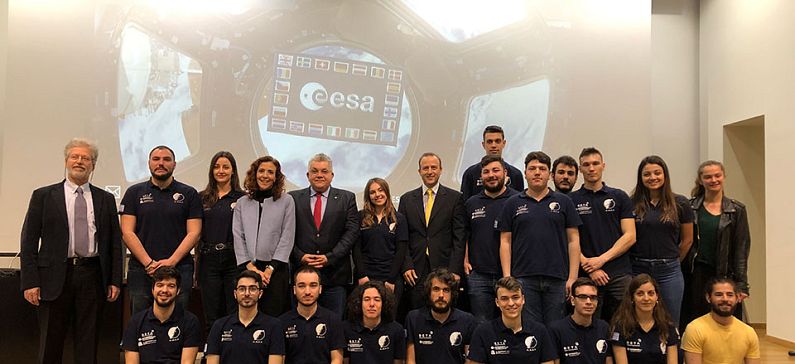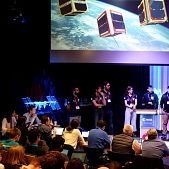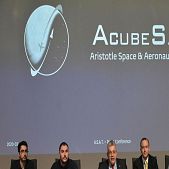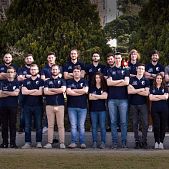
The AUTH launches to space
With the seal now of the European Space Agent (ESA), AUTH becomes the first Greek University to develop its own nano- satellite orbit 400 kilometers above the Earth in the framework of the “Fly your Satellite!” Program.
The results of the program “Fly your Satellite!” of the ESA which the Aristotle University of Thessaloniki participated with the Aristotle Space & Aeronautics Team (ASAT) student aerospace team presented at a press conference on Wednesday, March 4, 2020, at the KEDEA of the Aristotle University of Thessaloniki.
The technical proposal submitted by ASAT on behalf of the AUTH under the project “Acube SAT” in October 2019 was selected in the third phase of the program “Fly your Satellite!” and the Aristotle University CubeSat nanosheet is expected to launch in late 2022.
The evaluation and selection was made by experts from the European Space Agency.
The other two teams selected are SOURCE from the University of Stuttgart, Germany, and UCAnFly from the University of Cadiz, Spain.
The nanotechnology designed and manufactured by ASAT is called “A cube SAT”.
Its purpose is to carry out a biological experiment, which will study the effect of the space environment on cells similar to those of the human body, with the aim of drawing conclusions that will be used to generate biopharmaceuticals and biofuels.
ASAT is the Scientific Head of the Department of Mechanical Engineering of the Aristotle University of Kyriakos Yakinthos and the Head of the A cube SAT project team is the Professor of the Department of Electrical and Computer Engineering of the Aristotle University of Thessaloniki, Alkis Chatzopoulos.
“Believe in your vision and we are here next to you,” said the Rector of the Aristotle University of Thessaloniki, Professor Nikolaos G. Papaioannou, addressing members of the student group.
“Your distinction proves once again that Aristotle is the strongest brand name among Universities in Greece. We are happy for the excellent scientific staff we have and proud of all the young children who are tomorrow and showing us the way. It turns out that we can have the same opportunities in Greece, even tomorrow, all over the world. We believe it and we do it, “said the AUTH Rector.
Subsequently, Mr. Papaioannou referred to the overall activity of the Aristotle University of Thessaloniki: “This is not the first time that the Aristotle University has had significant space research activity. He participates in the space mission “Hera”, which is the first “planetary defense” mission of the European Space Agency, in the Scientific Investigation Team, which includes the Director of the Department of Astrophysics, Astronomy and Engineering, Associate Professor of Physics, Department of Physics , and the research team of the Faculty of Engineering of the AUTh.
Also, for the first time, a Greek team, a team from our University, led by Professor of the Department of Chemistry Theodoros Karapancios, handled a real-time experiment in space. It is a boiling experiment at the International Space Station with the launch of the experimental device from Cape Canaveral.
The control and control was done by the Remote Telemetry Station in the Chemistry Department of the Aristotle University of Thessaloniki, in the laboratory of Mr. Karapanchios. To this activity is added the multifaceted ASAT student group. “
About the talent and hard work of the children, as well as the dynamics that the AUTh is now developing in the field of Aerospace, was mentioned by the Vice-Rector for Research and Lifelong Learning of the AUTh, Associate Professor Efstratios Stylianidis. “The Aristotle University of Thessaloniki’s Aerospace and Aerospace team is now very close to making its dream come true.
We waited this day with great confidence and we are proud of what our children have accomplished. We believed in their abilities, talent and work, and we were with them all the time.
The AUTH has great potential in the development of aerospace research and innovation. The success of ASAT is coming to seal it and evolve it.
We congratulate our students who create, compete, compete, win, demonstrating internationally what our University in Aerospace can accomplish.
The Greek Space Industry is constantly evolving and the Aristotle University of Thessaloniki is here to help with its people, with their ideas.
The young people at AUTH will be starring next in the Aerospace field. Our bet as the Rectangular Authorities is to give them the incentive to stay here, to create and to move the country together higher. “
In her speech, Mrs Yiannopapa said: “One day without space, without satellites our lives would be different. Space today is an integral part of our lives. I’m proud of ASAT and for one more reason, because I’m Greek. “
“Anyone who is passionate about his vision achieves his goal. The children made us proud of this success. They have already worked for two years and have three years ahead of them to achieve this goal, as it is a very complex project, ”said AcubeSAT Project Team Professor, Department of Electrical and Computer Engineering, Aristotle University of Thessaloniki. Alkis Chatzopoulos.
“It is a great time for us and the University to be selected by the European Space Agency. It took many hours of work for this complicated project. We promise that our effort will be a ‘spark’ for more people to get involved in this field, “said Yannis Kotsakachidis, a student at the Department of Electrical and Computer Engineering at ASAT, a former project manager at ASAT.
The Aristotle Space & Aeronautics Team (ASAT) was founded in 2015 by 5 students of the Department of Mechanical Engineering at the Aristotle University of Thessaloniki. Today it has more than 70 members, students of the Departments of Mechanical Engineering, Electrical and Computer Engineering, Chemical Engineering, Physics, Informatics, Medicine and Biology.
Essentially the University’s first Aerospace student group, it aims to develop aerospace knowledge and culture among students and faculty.
He is working on three research projects: Aeronautics, which designs and manufactures innovative unmanned aerial vehicles (UAVs) capable of performing specific missions, Rocketry, which designs and manufactures high-powered rockets and the nanosecond “AcubeSAT”.
Source: Kathimerini













